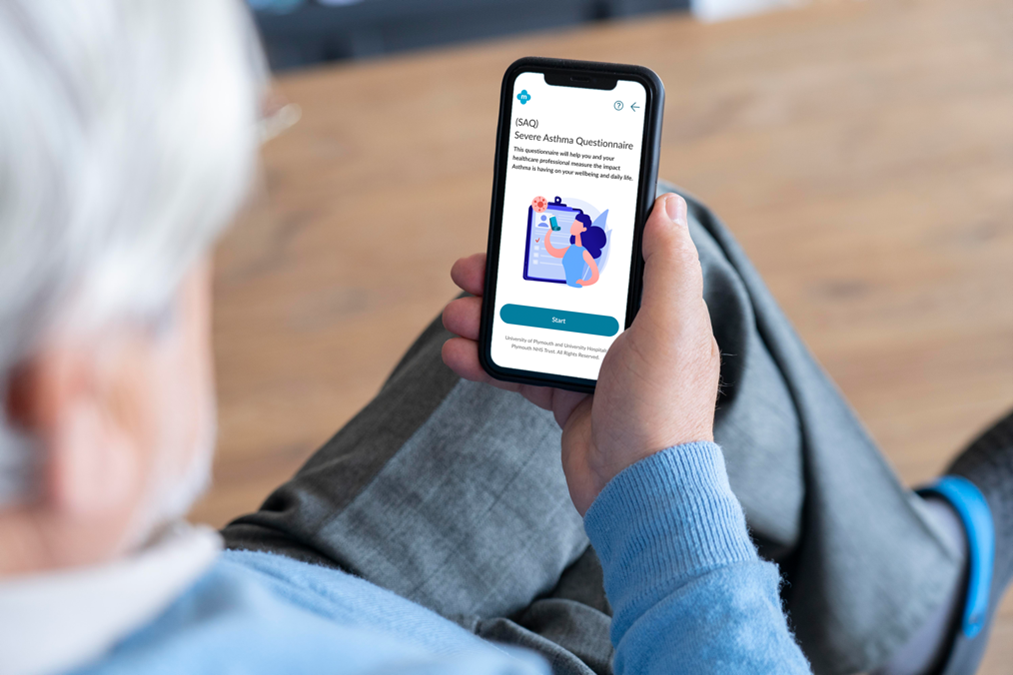A NEW app supported by the AHSN Network is helping clinicians to giver better care to patients with severe asthma on biologic therapy.
The myAsthma Biologic digital therapeutic supports patients prescribed asthma biologics to manage their asthma at home and allows their clinical teams to monitor them remotely.
Uncontrolled and severe asthma affects up to 200,000 people in the UK and it has a huge impact on their lives. Many are frequently admitted to hospital as an emergency and may experience serious side-effects from extended periods on steroid-based medication.
New NICE-approved biological therapies are available to support some patients with severe asthma. These injections work in a targeted way by disrupting pathways causing airways inflammation, helping to manage symptoms and reduce exacerbations.
The digital therapeutic was commissioned as part of the NHS England Accelerated Access Collaborative (AAC) Rapid Uptake Products programme, which the AHSN Network helps deliver, aims to expand access to asthma biologics by improving pathways and enable more patients to benefit from proven innovations.
Through the myAsthma Biologic app, patients have access to support including reminders to administer their next biologic injection, a diary to monitor their symptoms and self-management advice. Patients can also complete important questionnaires about their asthma and treatment at home in their own time, with the answers sent directly to their clinical team to review.
For severe asthma teams, the ability to remotely monitor patients can reduce the number of review appointments required and enables them to spend more time with those who need additional care. It also facilitates standardised and timely collection of clinical data through automated upload to the national severe asthma registry.
The digital therapeutic is now live in the Bristol severe asthma service, with the first hundred patients seeing the benefits of using the tool.
Professor James Dodd, clinical lead for complex airways disease at the North Bristol Lung Centre, North Bristol NHS Trust said: “We are delighted to be part of this national project to evaluate digitally supported pathways of care for patients with severe asthma. In a short period of time, we have been able to support over 100 of our patients on myAsthma Biologics app. It is a testament to the commitment of our team and the simplicity and user-friendly design of the app. Working in partnership with the AHSN Network and my mhealth, we are now looking at how we can make sure that both our patients and busy clinicians realise the benefits it has to offer and share this learning with colleagues across the UK. We know that asthma biologics have the potential to transform the lives of our patients and we see digitally therapeutics as a key part of our strategy to ensure safe and equitable access.”
Following the Bristol pilot project, more severe asthma centres in England will be rolling out the myAsthma Biologic product in the coming months, enabling more patients and clinicians to benefit.
Created by my mhealth Limited, the product is a collaboration between the AAC, the AHSN Network and University Hospital Southampton NHS Foundation Trust.
Dr Hitasha Rupani, Consultant Respiratory Physician, University Hospital Southampton NHS Foundation Trust and AHSN Network Asthma Biologics Clinical Champion, said: “Asthma Biologics are transformative treatments that can greatly improve the quality of life for severe asthma patients. This is an innovative project and I hope it will enhance the care we provide for our patients and streamline biologic monitoring. It has been great working with all the relevant stakeholders and it is fantastic that the AHSNs are supporting this development.”
Simon Bourne, Company President at my mhealth said: “As a respiratory focused digital therapeutics company, we are honoured to have been chosen to roll out our product nationally to better support patients on biologics, who are living with severe asthma. We have already seen the huge potential of digital therapeutics to improve patients’ symptoms and quality of life and deliver efficiencies across primary and community health care services and look forward to working with the specialist severe asthma centres across the UK.”
Find out more about how AHSNs are improving access to asthma biologics.

“Health equity is the attainment of the highest level of health for ALL people. Achieving health equity requires valuing everyone equally with focused and ongoing societal efforts to address avoidable inequalities, historical and contemporary injustices, and social determinants of health — and to eliminate disparities in health and health care.” (health.gov) Within the NHS there [...]

Sickle cell disease (SCD) is a serious and lifelong health condition. People with SCD produce unusually shaped red blood cells that can cause problems because they do not live as long as healthy blood cells and can block blood vessels. This can result in suffers experiencing painful episodes, called sickle cell crises, as well as anaemia, [...]

At the Royal Society of Medicine’s Tackling Inequalities conference it was clear from the passion in the room that great progress has been made across the system to better support some of our most under-served communities. To maintain this momentum, we must not just embed tackling health and healthcare inequalities in all that we do, [...]







